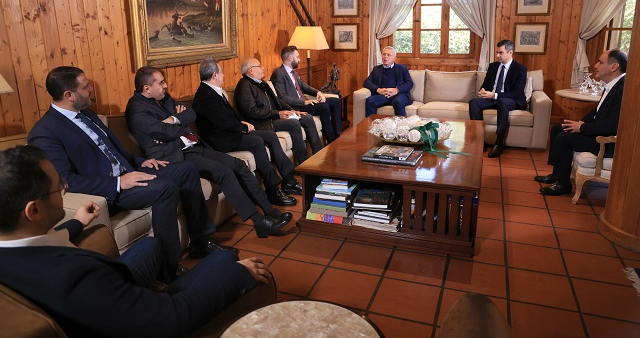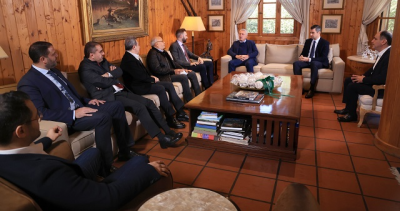Suleiman Franjieh, the head of the "Mardé Movement," received Taymour Jumblatt, the leader of the "Progressive Socialist Party," at his residence in Bnachii, accompanied by MPs Akram Chehayeb and Wael Abu Faour from the "Democratic Gathering" bloc. They discussed the latest developments in Lebanon, particularly regarding the Chief of Staff position, and touched upon key updates in the Gaza sector.
MP Akram Chehayeb stated, "We are honored to visit this historic house, and our visit today comes in the context of our efforts to help get Lebanon out of the difficult situation it is currently facing." He expressed gratitude to Franjieh for his ongoing role in preserving the hierarchy of military leadership, whether through extending the term of Army Commander General Joseph Aoun or by seeking to maintain the position of Chief of Staff and the Military Council, thus safeguarding the military institution that has preserved its existence and civil peace despite difficult and delicate circumstances, while fully fulfilling its role in defending Lebanon against the Israeli enemy.
He noted that "while there may be some differences in positions between us and the Mardé Movement, this does not diminish the friendship, respect, appreciation, and ongoing communication between us, emphasizing the historical and national relationship that ties Mikata to this house."
For his part, Franjieh welcomed Jumblatt and his delegation, affirming that "this house is theirs despite some differences in viewpoints between the Mardé Movement and the Socialist Party, which do not prevent ongoing communication between us, based on our belief in dialogue and the language of communication."
He added, "What we mostly agree on today with the Progressive Socialist Party is that there is no way for Lebanon to emerge from its dark tunnel without communication and dialogue among the different parties. We hope to witness activity on this front after the holiday period."
Franjieh confirmed that "the Mardé Movement is committed to various Lebanese state institutions despite the questions raised about the principle of appointments in the absence of a president." He criticized the tendency to seek partial solutions each time, while the actual solution lies in electing a president who will restore order to Lebanese institutions.
He continued, "Regarding the extension of Army Commander General Aoun, we saw that the alternative would lead the country into the unknown, which is what prompted us to agree to this extension. Today, we feel that there is significant concern from both the military institution and the Progressive Socialist Party regarding the Military Council to preserve the regular functioning within the army."




